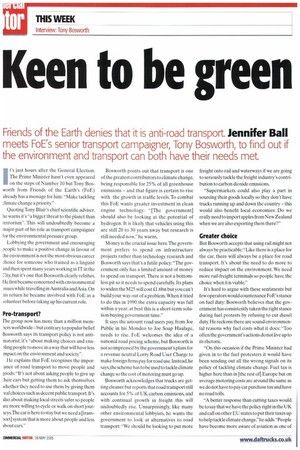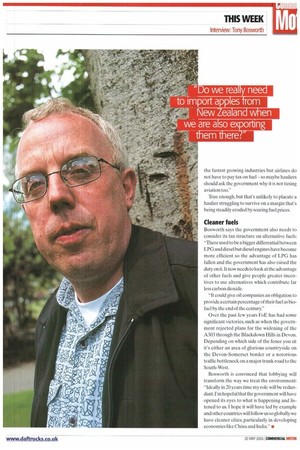Keen to be green
Page 24

Page 25

If you've noticed an error in this article please click here to report it so we can fix it.
Friends of the Earth denies that it is anti-road transport. Jennifer Ball meets Fon senior transport campaigner, Tony Bosworth, to find out if the environment and transport can both have their needs met.
It's just hours after the General Election. The Prime Minister hasn't even appeared on the steps of Number 10 but Tony Bosworth from Friends of the Earth's (FoE) already has a message for him: "Make tackling :innate change a priority."
Quoting Tony Blair's chief scientific adviser, he warns it's "a bigger threat to the planet than terrorism". This will undoubtedly become a major part of his role as transport campaigner for the environmental pressure group.
Lobbying the government and encouraging people to make a positive change in favour of the environment is not the most obvious career .7hoice for someone who trained as a linguist ind then spent many years working in IT in the City, but it's one that Bosworth clearly relishes. He first became concerned with environmental ,ssues while travelling in Australia and Asia. On his return he became involved with FoE as a volunteer before taking up his current role.
Pro-transport?
lle group now has more than a million mempers worldwide—but contrary to popular belief Bosworth says its transport policy is not antimotorist: it's "about making choices and ena31ing people to move in away that will have less mpact on the environment and society".
He explains that FoE recognises the impor:ance of road transport to move people and ;oods: "It's not about asking people to give up :heir cars but getting them to ask themselves Nhether they need to use them by giving them :eat choices such as decent public transport. It's tiso about making local streets safer so people ire more willing to cycle or walk on short jourleys.The car is here to stay but we need a [trans)ort] system that is more about people and less shout cars." Bosworth points out that transport is one of the greatest contributors to climate change, being responsible for 25% of all greenhouse emissions — and that figure is certain to rise with the growth in traffic levels. To combat this FoE wants greater investment in clean engine technology; "[The government] should also be looking at the potential of hydrogen. It is likely that vehicles using this are still 20 to 30 years away but research is still needed now," he warns.
Money is the crucial issue h ere.The government prefers to spend on infrastructure projects rather than technology research and Bosworth says that's a futile policy: "The government only has a limited amount of money to spend on transport. There is not a bottomless pit so it needs to spend carefully. Its plans to widen the M25 will cost f1.6bn but you can't build your way out of a problem. When it tried to do this in 1990 the extra capacity was full within a year; at best this is a short-term solution buying government time."
It says the amount road users pay, from Joe Public in his Mondeo to Joe Soap Haulage, needs to rise. FoE welcomes the idea of a national road pricing scheme, but Bosworth is not so impressed by the government's plans for a revenue neutral Lorry Road User Charge to make foreign firms pay for road use. Instead, he says,the scheme has to be used to tackle climate change so the cost of motoring must go up.
Bosworth acknowledges that trucks are getting cleaner but reports that road transport still accounts for 5% of UK carbon emissions, and with continual growth in freight this will undoubtedly rise. Unsurprisingly, like many other environmental lobbyists, he wants the government to look at alternatives to road transport: "We should be looking to put more freight onto rail and waterways if we are going to seriously tackle the freight industry's contribution to carbon dioxide emissions.
"Supermarkets could also play a part in sourcing their goods locally so they don't have trucks running up and down the country — this would also benefit local economies: Do we really need to import apples from New Zealand when we are also exporting them there?"
Greater choice
But Bosworth accepts that using rail might not always be practicable: "Like there is a place for the car, there will always be a place for road transport. It's about the need to do more to reduce impact on the environment. We need more rail-freight terminals so people have the choice when it is viable," It's hard to argue with these sentiments but few operators would countenance FoE 's stance on fuel duty: Bosworth believes that the government has consistently taken the right stance during fuel protests by refusing to cut diesel duty. He reckons there are sound environmental reasons why fuel costs what it does: "Too often the government's actions do not live up to its rhetoric.
"On this occasion if the Prime Minister had given in to the fuel protesters it would have been sending out all the wrong signals on its policy of tackling climate change. Fuel tax is higher here than in [the rest of] Europe but on average motoring costs are around the same as we do not have to pay car purchase tax and have no road tolls.
"A better response than cutting taxes would be to say that we have the policy right in the UK and call on other EU states to put their taxes up to help tackle climate change,"he adds."People have become more aware of aviation as one of the fastest growing industries but airlines do not have to pay tax on fuel — so maybe hauliers should ask the government why it is not taxing aviation too."
True enough, but that's unlikely to placate a haulier struggling to survive on a margin that's being steadily eroded by soaring fuel prices.
Cleaner fuels
Bosworth says the government also needs to consider its tax structure on alternative fuels: "There used to be a bigger differential between LPG and diesel but diesel engines have become more efficient so the advantage of LPG has fallen and the government has also raised the duty on it. It now needs to look at the advantage of other fuels and give people greater incentives to use alternatives which contribute far less carbon dioxide.
"It could give oil companies an obligation to provide a certain percentage of their fuel as biofuel by the end of the century."
Over the past few years FoE has had some significant victories, such as when the government rejected plans for the widening of the A303 through the Blackdown Hills in Devon. Depending on which side of the fence you sit it's either an area of glorious countryside on the Devon-Somerset border or a notorious traffic bottleneck on a major trunk road to the South-West.
Bosworth is convinced that lobbying will transform the way we treat the environment: "Ideally in 20 years time my role will be redundant. I'm hopeful that the government will have opened its eyes to what is happening and listened to us. I hope it will have led by example and other countries will follow us so globally we have cleaner cities, particularly in developing economies like China and India." •












































































































































































































































